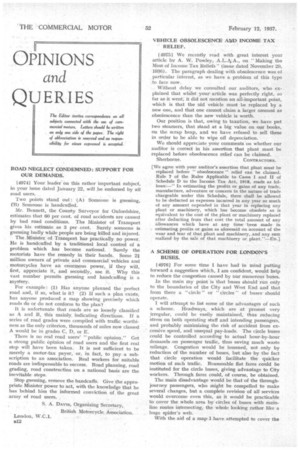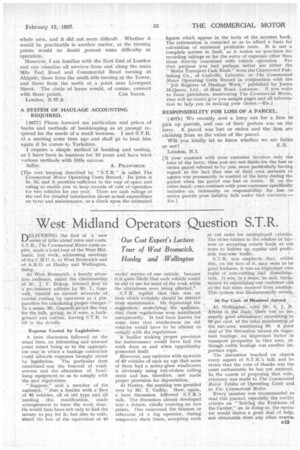OPINIONS and
Page 118

Page 119

If you've noticed an error in this article please click here to report it so we can fix it.
QUERIES
The Editor invites correspondence on all subjects connected with the use of commercial motors. Letters should be written on only one side of the paper. The right of abbreviation is reserved and no responsibility for views expressed is accepted.
ROAD NEGLECT CONDEMNED: SUPPORT FOR OUR DEMANDS.
L49741 Your leader on this rather important subject, in your issue dated January 22, will be endorsed by all road users.
Two points stand out; •(A) Someone is guessing, (13) Someone is handcuffed.
Mr. Bennett, the County Surveyor for Oxfordshire, estimates that 60 per cent, of road accidents are caused by bad road conditions. The Minister of Transport gives his estimate as 3 per cent. Surely someone is guessing badly while people are being killed and injured.
The Minister, of Transport has practically, no power. He is handcuffed by a traditional local control of a problem which has become national. Surely the motorists have the remedy in their hands. Some 2i million owners of private and commercial vehicles and motorcycles have an enormous power, if they will, first, appreciate it, and secondly, use it. Why this vast number permits guessing and hahdcaffing is a
mystery. • For example: (1) Has anyone planned the perfect road and, if so, what is it? (2) If such a plan exists, has anyone produced a map showing precisely which roads do or do not conform to the plan?
It is unfortunate that roads are so loosely classified as A and B, this mainly indicating directions. If a series of road grades were compiled with traffic worthiness as the only criterion, thousands of miles now classed A would be in grades C, D, or E.
There is no real road users' "public opinion." Get a strong public Opinion of road users and the first real step will have been taken. It is not sufficient to be merely a motor-tax payer, or, in fact, to pay a subscription to an association. Real workers for suitable roads are indispensable to success. Road planning, road grading, road construction on a national basis are the inevitable steps.
Stop guessing, remove the handcuffs. Give the appropriate Minister power to act, with the knowledge that he has behind him the informed conviction of the great army of road users.
Davis, Organizing Secretary,
British Motorcycle Association.
London, W.C.1. n12 VEHICLE OBSOLESCENCE AND INCOME TAX RELIEF.
[4975] We recently read with great interest your article by A. W, Powley, A.L.A.A., on " Making the Most of Income Tax Reliefs" (issue dated November 20, 1966). The paragraph dealing with obsolescence was of particular interest, as we have a problem of this type to face now.
Without delay we consulted our auditors, who explained that whilst your article was perfectly right, so far as it went, it did not mention an all-important point, which is that the old vehicle must be replaced by a new one, and that one cannot claim a larger amount as obsolescence than the new vehicle is worth.
Our position is that, owing to taxation, we have put two steamers, that stand at a big value on our books, on the scrap heap, and we have refused to sell these in order to be able to wipe off depreciation.
We should appreciate your comments on whether our auditor is correct in his assertion that plant must be replaced before obsolescence relief can be claimed.
Sherborne. CONTRACTORS.
[We agree with your auditor's assertion that plant must be replaced before " obsolescence " relief can be claimed. Rule 7 of the Rules Applicable to Cases I and II of Schedule D to the Income Tax Act, 1918, reads as follows:—" In estimating the profits or gains of any trade, manufacture, adventure or concern in the nature of trade chargeable under this Schedule, there shall be allowed to be deducted as expenses incurred in any year so much of any amount expended in that year in replacing any plant or machinery, which has become obsolete as is equivalent to the cost of the plant or machinery replaced after deducting from that cost the total amount of any allowances which have at any time: been made in estimating profits or gains as aforesaid on account of the wear and tear of that plant and machinery, and any sum realized by the sale of that machinery or, plant.'--ED.1
A SCHEME OF OPERATION FOR LONDON'S' BUSES.
[4976] For some time I have had in mind putting forward a suggestion Which, I am confident, would. help to reduce the congestion caused by our numerous buses.
In the main my point is that buses should 'rim only to the boundaries of the City and West End and that from there a " circle " or " circles " of buses should operate.
I will attempt to list some of the advantages of such a scheme. Headways, which are at present very irregular, could be easily maintained, thus reducing 'stress on both operating staff and intending passengers, and probably minimizing the risk of accident from excessive speed, and unequal pay-loads. The circle buses could be controlled according to actual hour-by-hour demands on passenger traffic, thus saving much waste mileage. Congestion would be lessened, not only by reduction of the number of buses, but also by the fact that circle operation would facilitate the quicker motion of such traffic. Reasonable flat fares could be instituted for the circle buses, giving advantage to City workers. Through fares could, of course, be obtained.
The main disadvantage would be that of the throughjourney passengers, who might be compelled to make several changes, but a complete revision of all services would overcome even this, as it would be practicable to cover the whole area by circles of buses with Mainline routes intersecting, the whole looking rather like a huge spider's web.
With the aid of a map :I have.attempted to cover the
whole area, and it did not seem difficult. Whether it would be practicable is another matter, as the turning points would no doubt present some difficulty in operation.
However, I am familiar with the East End of London and can visualize all services from east along the main Mile End Road and Commercial Road turning at Aldgate, those from the south side turning at the Tower, and those from the north at a point near Liverpool Street. The circle of buses would, of course, connect
with these points. CAR SALES. London, N.W.9.
A SYSTEM OF HAULAGE ACCOUNTING REQUIRED.
[49771 Please forward me particulars and prices of books and methods of bookkeeping as at present required for the needs of a small business. I met S.T.R. at a meeting some time ago and shall go to hear him again if he comes to Yorkshire.
I require, a simple method Of booking and costing, as I have been in business for 10 years and have tried various methods with little success.
Selby. • . , A. PILSWORTH.• [The cost keeping described by " S.T.R." is called The Commercial Motor Operating Costs Record. Its price is 1s. 3d. and it proVides sufficient in the way of space and ruling to enable you to keep records of cost of operation for two vehicles for one year. There are cash rulings at the end for detailed information about actual expenditure on tyres and maintenance, as a check upon the estimated figures which appear in the body of the account book. The information is compiled so as to afford a basis for calculation of minimum profitable rates. It is not a complete system in itself, as it makes no provision for recording takings or for the entry of expenses other than those directly concerned with vehicle operation For that purpose you had perhaps better use either the "Motor Transport Cash Book' from the Charnwood Publishing Co., of C,oalville, Leicester, or The Commerical Motor Operating Costs Record in conjunction with the " Job Register of Haulage Work," published by James McQueen, Ltd., of Moat Road, Leicester. If you write to those publishers, mentioning The Commercial Motor. they will no doubt give you sample pages and all information to help you in making your choice.--En.]
RESPONSIBILITY FOR LOSS OF A PARCEL.
I:49781 We recently sent a lorry out for a firm to pick up parcels, and one of their porters was on the lorry_ A' parcel was 'lost or stolen and the firm are claiming from us the value of the parcel.
Will you kindly let us know whether we are liable or not? E.S. London, Ni.
[If your contract with your customer involves only the loan of the lorry,. thenyou are not. liable-for the lost or stolen parcel referred to by you, more particularly having regard to the fact that one of their own servants or agents was presumably in control of the lorry during the period when the parcel was lost or stolen. If, on the other hand, your contraetwithyour customer 'specifically includes an indemnity or responsibility for lost or stolen parcels your liability falls under that warranty.— ED.]




























































































































































